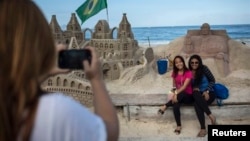BUENOS AIRES —
Not even an Argentine pope's planned return to South America has inspired the government to loosen strict currency controls for prospective pilgrims trying to see Pope Francis in neighboring Brazil next week.
Thousands of young people, many of modest economic means, plan to travel to Rio de Janeiro for the Catholic Church's World Day of Youth to greet the Argentine native on his first trip abroad as head of the Church when he arrives on Monday.
But restrictions on exchanging pesos for Brazilian reais have complicated their plans and many here say the rules should have been eased for the occasion.
"The government isn't being reasonable," Buenos Aires-based Bishop Raul Martin told Reuters. "Obviously many Argentines were going to go to Brazil for this."
Martin said some 18,000 youth have officially registered for the event in Rio, where many will sleep in schools sponsored by religious organizations and do mission work. He reported receiving daily phone calls from people with problems changing money.
Local media estimates some 42,000 Argentines will attend.
Before traveling abroad, Argentines must apply for permission to exchange pesos with tax regulators. They are asked details of their travel plans and must present documents, including details of their salaries, to authorities.
The problem is that many traveling to the World Day of Youth are too young to work, said Martin, and are being denied reais because they have no proof of salary. Taking money out of an ATM machine with a credit card, previously the option of last resort, is no longer feasible in Brazil as Argentine withdrawals are restricted in countries that share a border with Argentina.
Argentina's leftist President Cristina Fernandez slapped new controls on foreign currency purchases just after winning re-election in October 2011, to try to stop capital outflows.
Difficulty exchanging money has pushed many Argentines to the black market in search of dollars, and currency venders line the streets of major cities whispering "change" to passing pedestrians.
Church leaders, however, do not want to encourage illegal activity and are simply requesting information from the government on how young people can legally obtain a limited amount of Brazilian currency, Martin said.
A spokesman for Argentina's central bank said existing regulations allow religious institutions to exchange money directly with the bank, though individuals traveling to see the pope on their own must apply with tax regulators as usual.
Martin shunned the option of involving churches in currency exchanges.
"It seems ridiculous to require young people to go to a priest in order to exchange a small amount of money to go to a brother nation for a youth fair," he said.
Thousands of young people, many of modest economic means, plan to travel to Rio de Janeiro for the Catholic Church's World Day of Youth to greet the Argentine native on his first trip abroad as head of the Church when he arrives on Monday.
But restrictions on exchanging pesos for Brazilian reais have complicated their plans and many here say the rules should have been eased for the occasion.
"The government isn't being reasonable," Buenos Aires-based Bishop Raul Martin told Reuters. "Obviously many Argentines were going to go to Brazil for this."
Martin said some 18,000 youth have officially registered for the event in Rio, where many will sleep in schools sponsored by religious organizations and do mission work. He reported receiving daily phone calls from people with problems changing money.
Local media estimates some 42,000 Argentines will attend.
Before traveling abroad, Argentines must apply for permission to exchange pesos with tax regulators. They are asked details of their travel plans and must present documents, including details of their salaries, to authorities.
The problem is that many traveling to the World Day of Youth are too young to work, said Martin, and are being denied reais because they have no proof of salary. Taking money out of an ATM machine with a credit card, previously the option of last resort, is no longer feasible in Brazil as Argentine withdrawals are restricted in countries that share a border with Argentina.
Argentina's leftist President Cristina Fernandez slapped new controls on foreign currency purchases just after winning re-election in October 2011, to try to stop capital outflows.
Difficulty exchanging money has pushed many Argentines to the black market in search of dollars, and currency venders line the streets of major cities whispering "change" to passing pedestrians.
Church leaders, however, do not want to encourage illegal activity and are simply requesting information from the government on how young people can legally obtain a limited amount of Brazilian currency, Martin said.
A spokesman for Argentina's central bank said existing regulations allow religious institutions to exchange money directly with the bank, though individuals traveling to see the pope on their own must apply with tax regulators as usual.
Martin shunned the option of involving churches in currency exchanges.
"It seems ridiculous to require young people to go to a priest in order to exchange a small amount of money to go to a brother nation for a youth fair," he said.





